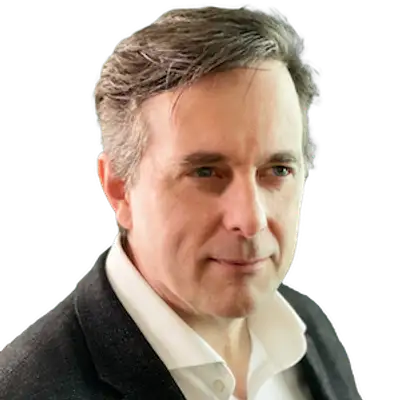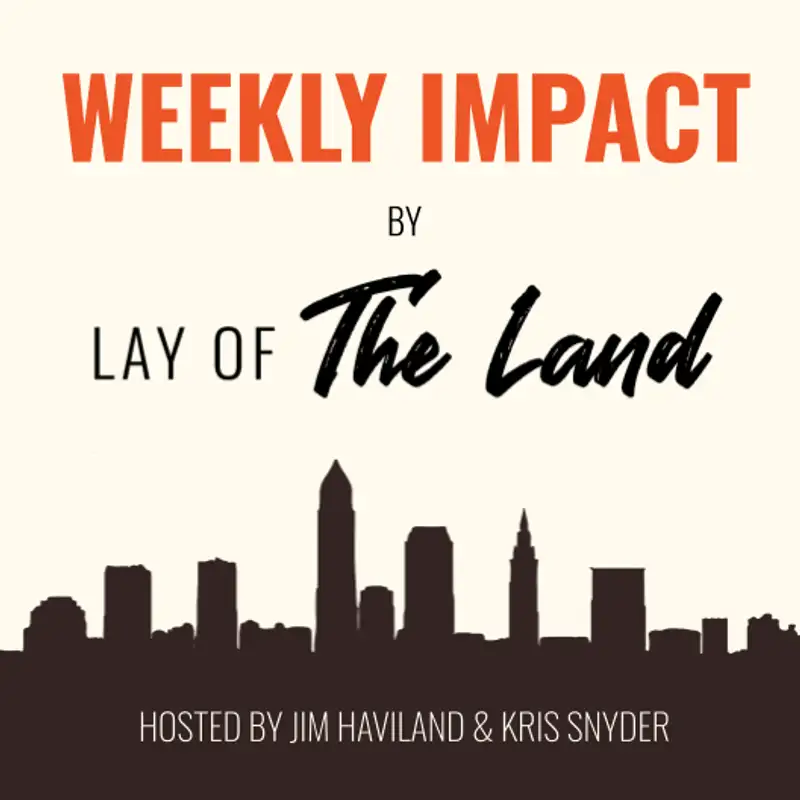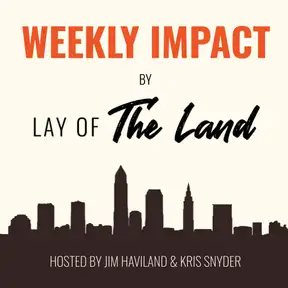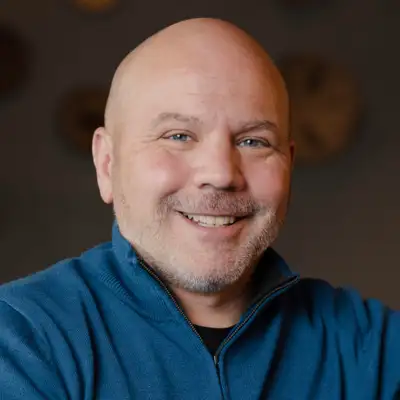09-17-24 Embrace Pet Insurance, Finding your Partner, Marketing Moves
Jim Haviland (00:01.378)
Hello everyone. This is Jim Havilland and this is weekly impact from the of the land. is 17 September, nine, 2020, 19, 2024. It's been a long time. and I'm, yes, as I'm saying, we're here in the ILC. Kris how you doing today? I'm doing great. didn't do the intro right. No, this isn't our job. This is our part -time. Okay. So, great, great episode to talk about this week. got Laura Bennett and Alex, Krooguk Krooguk
Alex, I am sorry, man. Yeah, I didn't apologize. know, Jeff could take care of us and actually say these things on the show. But anyway, because he's right there. You get it right. But so that's episode one eighty three, Kris. And this is a good one because we we talk a lot about these early stage builders, but this is one where we get the full arc of the story, which I really appreciate.
Yeah. And you know, for for me, I just remember back to these early stages of JumpStart Yeah. And one of our other you know, good friends, Gabe Turok, right with preemptive was one of the other ones. And I believe they shared office space. Like, I just remember walking into his office and seeing embrace insurance on there. So but I might be wrong, but I'm pretty certain they did.
It's part of that whole thing. All right. So it's brace insurance, pet insurance. And now it seems like, duh, of course you do it. But it was hard because it was this is when the Internet was hard when you're still putting servers online. We remember that closets with fans on the. Yeah. I mean, was like, yeah, yeah. You're just hacking this stuff. They'll never know. They'll never know what that was like walking up uphill to school both ways. Yeah. Yeah. And.
And insurance was hard. I I think it's very interesting to hear the technical details behind having to get a regulated industry right. I'd like that love to get the gut of the details there. But also they went through some very real things like just very much like you and I did with 2008 2009 being like an entirely different. The problem with having a dynamic market, Kris, is that suddenly, a lot of people get wiped out who didn't do anything wrong. Right. Well, and those those turns happen. I think
Jim Haviland (02:13.794)
have been a 10 year time span, you know, this whether we buy in or not, like you're gonna have two great years. Yes, right. You're gonna have two terrible years, you're gonna have four okay years. And if you buy into that cycle at all, it's really hard to know when you're what year you're in. Right? Like this could be the okay here. This is one of the terrible years going into annuals. I've been studying the, you know, the turnings, you know, the four turnings model of long, long lifespans being
a set of turnings and we're in the fourth turning right now by most people's because no one trusts anything and we're about to face disaster. But being able to use it as a planning model because if it's just part of, we can talk about why's, but if it's just part of human history and we've been able to map it out for a long time, just go with it, bro. I tell my clients, is it going to be recession? Yes. Do I know when? I do not.
You just have to make sure you're building resilience into yourself so that you can survive that result. So some of the things I liked about this episode, I love the fact that, you know, this is true of MBA students, not for something kind of experts, these founders. They did the market research first, Kris. Right. Because it's what a, you know, a we love that story. Like any college experience where you go to people decide for, I think there's four people total when they were doing the project project for their MBA program.
Wharton. Yeah, yeah, yeah. Pretty good school. I think they do well mostly. But but at the end of the day is like, they just did just let it lie. Right? Like they decided there was a there there through all the research they did, and decided that they were going to do the hard work of founding. And also, both not being us citizens at the time was interesting. Yeah, that that work and figuring out how to make all that come together. And then the telling the story is part of that.
extension coming out of school, like how they accidentally land in Cleveland and hat, you know, hats off to progressive insurance. Both have ties there. You know, the, know, this is part of like, when I was at the in the triangle and in research triangle park in North Carolina, that was the thought there that we, if they had all these giant companies there, if they gave them, you know, free space,
Jim Haviland (04:28.594)
One, they'd keep all of the PhDs that they were all minting with all those schools around there, but also they would attract people that would settle there and then go build other businesses. I mean, it took them a long time to get to that model, right? So the lesson of that was it took a whole generation of people doing their jobs before their kids went off to college and then they started being able to create entrepreneurial success. That was the interesting part of model. It didn't happen automatically because you have to have...
in your area, you have to see that this actually is happening. And we haven't had that many unicorns. So but let's start that flywheel turning Kris. Because you have to have that 10, 20, 30 year outlook, right? At least. And that's how you're developing those leaders and and entrepreneurs and people who are OK taking the risk for it. Yeah, because because, being crazy isn't a good model for.
building a business. It's like, but being, you know, seeing something I like that they were passionate about, they saw something in this, I think there's something here and they want to go after it. That's a great model as opposed to just like, I think the world should be like this, and I'm gonna, you I'm gonna burn rubber to get there. I call this the kill the dog moment, too. I like this one. You know, one of my most recent famous favorite settings say sayings that I learned from tik tok was data over dogma.
There's a go look it up. There's a great podcaster who does a lot of work on this, but it has nothing to with business. But it works. But it works for so many people because we do have these dogmatic beliefs about ourselves and whether we're normal or whether we're the mean. Right. And I know I'm not the mean. I'm my own little weird self. And I need to look at the data. What does the data tell me about where the market is and what's opportunity? Because they got they heard a lot.
go kill the dog. Well, there's just an inherent bias in ourselves, right? And so even I remember back going, going to them and JumpStart funded them on like, pet insurance, like I didn't own a pet, right? Like, so I couldn't relate to that. So you're right. If you would have asked me not being a pet owner, when I kill the dog or pay $1 or $10 ,000, I would say, yeah, you know, think you should kill the dog. Well, and that's the thing. I mean, so I mean, just, we have to recognize that bias and go look for the data. It's like, you believe in this, huh? Be curious about that. Don't
Jim Haviland (06:45.9)
You know, cause it's easy to say no. Well, and I think most of those, most of the time that, that we look back on investments we should have made, we should have understood better. It's because we, we didn't know we didn't have the data. couldn't, don't go into shit. don't know, but, but, you know, but definitely, know, if, if you're in the position of making decision, you know, be curious. Yeah. All right. I think that coach Lasso says, be curious. Yeah. Yeah.
All right. And the last one here is, you know, they're talking about that 2008, 2009 period, this responsibility of investors and how that kind of helped propel them forward. We have to solve this because we've convinced all these people that we're doing this. And it's not just the investors, but everyone that's working with you and have taken shares. you know, we want to make a good, we want to make, we want to do this, do right by all the people that have trusted us. Yeah. And because we're both
big fans of Simon Sinek and the infinite game, you either run out of the will or the resource to play the game. Right. Part of the will is the people that you're trying to honor and respect that believed in you that gave you hard earned dollars, right? At the initial investment side. they talked about being minority shareholders, right? They because they raised money early because they did what they did along the way. Lesson learned. Lesson learned. Right. Now you're a minority shareholder and you look at the calculation, the math of it.
in the whole thing. And you're like, at some point, you're going to exit stage left, which they did. And let the thing run because it's not, you know, they could, they probably could have made more money the year over a year, you know, because they could. Yeah. Laura pointed out that they might, they might've made other decisions, you know, knowing what they know now, because they eventually did hit the hockey stick. Right. They had a model, the hockey stick, like this is what, what it could be. The timing is always the hardest part about that. I was, I built three
of my reverse income statement models over the last two weeks for people. it's like timing on that is like, yeah, you make a lot of assumptions about when you when you that's gonna actually hit and you can be wrong. and just for those listeners out there that haven't experienced what they experienced. There's two factors to this one. It is the total amount of equity that you own at the class that you own it. Yeah, right. Like so you could be the largest common shareholder, but the pref stack is on top of you eating away at it all the time. And
Jim Haviland (09:07.744)
because you control a class, that's good, but it doesn't mean the end result is actually gonna pay you out the way you think it's gonna pay out. Kris, in both of our lives, how often have prefs completely changed the game? And perhaps we should say for people who don't know, when you're an investor, some classes have preferential access to whatever happens, including voting rights or how they get paid out. It can accrue an interest rate that's not in cash base, but it pays out at the time of liquidity.
And there's a waterfall effect and you know, being good at understanding that. Yeah. Something that most of the time, and I remember this in my early days, all the way aging myself, Jim back to .com days. Yeah. Didn't understand when we took VC. No, and all that worked. Same, blown, blown that toe off. Don't do it. My friends, before you take the money, go understand the preps and get, get some, get a, have, find a mentor, call us. We'll tell you about it. We're all things get wrong. All right. So,
great, great show for those, for those people that want to see the full arc of things. And Kris, last thing I want to point out is they went, they had very similar timeline to our Vox mobile story. A hundred percent. And, but I do actually want to reach out to Laura and Alex now because they didn't say, and Jeffrey didn't ask, what are they working on? Yeah, I know. I'm doing right now. Right. And so I got to reach out and I got to give a shout out because you used to at one point live in Shergren Falls. I live in Shergren Falls. they talked about the Starbucks, the coffee shop, the whole night. How many meetings have you had there? Yeah.
Too many. So anyways, I'm going to reach out and just see what they're working on. Yeah. Yeah. It's a great little spot. If you're virtually on East side, if you haven't been out there and just hung out there, it's a good spot to free your mind. Okay. So Kris, so there are two things I wanted to talk about from that episode that are really leaning into our coaching practice and how we help people. But it's finding the right partner. There's only there was a way to find the right partner. And there are a handful of ways that you can be more predictive about finding the right partner. can't.
Guarantee you're gonna fall in love like, you know and do a great job and they didn't fall in love They're they're married to other people but they're but they but they found that good relationship for working and that is important but we certainly with EOS we've both been EOS implementers the visionary implementer pair That's a great genius moment from from Gene Wickman. Yeah, because you and by the way, I think as a thesis of investing I'm down with this now because a solopreneur. Yeah, it's really hard to build and scale
Jim Haviland (11:29.219)
without that other partner and coaching companies at this point, 50 plus, the ones that really have the momentum is there is there's a partnership, right? And so that's a visionary integrator. The integrator is actually good at follow through and details and getting everything in the visionary and they play off of each other and they don't bring the baggage to the whole leadership team. That's an important part. You prove that you already understand that you're not going to build this alone, that it's not just about you, that it's that and you have to be willing to compromise.
Right? So these are all these are all leadership qualities that you have to have. So if you're a solo, there's a good chance you're missing some of that stuff. and there's the trust and respect, right? Like, and they did tell the story a little bit about mom and dad fighting at work and being right. That does happen along the way because it will feel that way. Right. Especially if it's probably male female. But there's even if it's male male, there's still a squabble that happened in the people. It's a very real thing. We see it in lots of, you know, know, dual founder, even three founder companies.
You I actually have told many companies that I've coached, you have a mommy daddy problem, right? Because you're going to, you you're going to know here, you're to go over there and you know, and you just have as that partnership, you have to recognize it's going to happen and just be listening for it. Right. And not let it happen. Like we are a united front. That's what, that's the most important part about, I think from Gino, is that we're a united front.
in front of everybody else. We don't fight in front of anybody else. We can disagree, respectfully. We're going to have to demonstrate the right behaviors of how we're going to work together as a company. we don't let everyone work around us. And for those listening, mean, there's a book called Rocket Fuel, which is part of the US Traction Library. There's a quick assessment that will help you understand which one are you. Are you more the integrator operator or are you more the visionary in that moment? I think it's probably not science -based. It's also just a good lens to look through.
Yeah, it's a model. It's useful, not accurate. But there are some, I have one that's equally not accurate. I always, in my teams, I ask the question, is, it's the Microsoft Office question. Who solves problems with PowerPoint? Who solves problems with Word? Who solves problems with spreadsheets? You need to have all three covered. Right. Because you're going to be in trouble, especially if you don't have anyone that does anything with spreadsheets, which I've seen plenty. It's like, we're going to meander our way through this. Someone's got to write down some numbers.
Jim Haviland (13:53.89)
Profiling, all like Kolbe, Myers -Briggs. We've seen that used quite a bit. I know at 90 early on, we realized they had too many NTs in the group, which is a common problem with startups. And Culture Index, hardest one to understand, but these are all good tools to use to figure out whether you've got a good compatibility solution. Yeah, and one of my favorite parts about Colby and these things is when you get done taking those assessments, it says you're 100 % right.
Right. Because you are. You always. Right. You're perfect the way you are. Just know what it is. That's right. Embrace it. The last thing I want to say about is the core values. You know, great call out from Alex that I mean, so they have the operating system. Yes, Virginia, you have an operating system. And the thing that they write is they developed strong core values and stuck to them. And Alex gave props to Laura for really leaning into that. It's critical, you know, and, you know, if you don't share core values, you're not going to work well together. And it isn't like you're either of your
bad people are wrong. just, you need to have that kind of consistency of communication that comes from having people that know who you are and understand you. Well, and this is how we hire. This is how we retain. This is how we promote. This is how we transition out. Yep. Like those core values, especially if you can, if they land well enough that you feel the emotionality of the core values, right? Like if, and we do in the EOS world, we talk about having a core value speech.
And it's not I have, you know, I have a plan speech. It is I have a dream speech. Right. is that emotional moment where you get it right. Right. And three to five is enough. And then people go, yes, that's me, too. Versus I'm not sure if this is the right place for me. And if you're not sure, then it's not. Otherwise, it should land. My version of right people, right seats, of course, is that the hell yes people only have people. And and I teach you like your core values.
telling them about your core values in the interview, you tell them about it and you say, it's like taking them to church. Like, this is what we believe. This is what we feel deeply. If you don't feel deeply about these things, you're going to stand out. It's not going to go well for either of us. if I say something and you're like, I don't get that, just know that you're not bad person. You're probably not going to be a great, you're never going to be an A player here. There's other places for you to be.
Jim Haviland (16:07.464)
All right, Kris. So let's talk about you. So you did another podcast this week. I did. Yeah, it was marketing moves, which is vivid fronts podcast. Andrew spot. Andrew spot. Yep. Great studio, Jim. I was jealous to be honest. They figured out sound inside. Hopefully ours is coming across. Okay, go check out there. It looks good. great. Yeah. And I think they're actually leveraging it as an offering as part of what they do as a marketing agency, right? Helping promote their customers. They're also trying to tell the stories of entrepreneurs
small, medium sized business owners, right? Making it all happen inside Northeast Ohio. it felt really good to be on there. And I got to talk about, you know, my journey, but also what the work we're doing at 90. They run on the EOS powered by 90, which is fun to talk to as well. Perfect. Yeah. I mean, they're good folks. I love Andrew. We've had great conversations and I'm excited that they're, you know, we talk about building community, Kris, you know, the Venn diagram of all the little circles we've got out there and bringing them together and having the crossover in the Venn. That's when the magic happens.
Yep. All right. Kris, we got everything else we got to cover this week. I think we got weekly impact done. All right, Kris, have a great week, man. You do the same, Thanks.
Creators and Guests



